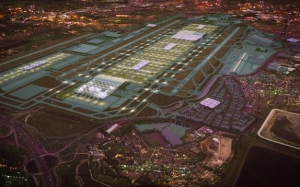The West of England could benefit from billions of pounds of work linked to the expansion of Heathrow Airport by becoming one of its four regional logistic hubs.
The move was announced today by Metro Mayor Tim Bowles as he launched a new economic blueprint for the area, which includes Bath & North East Somerset, Bristol and South Gloucestershire.
The government last year chose Heathrow, the UK’s busiest airport, over Gatwick as its preferred location for air travel expansion in the South East. 
Under the proposals – which have not yet been approved by Parliament and could still face legal challenges – a third runway will be built at Heathrow, possibly opening as early as 2025.
Heathrow wants to spread the benefits associated with what would be one of the UK’s largest infrastructure projects, pictured in a computer-generated image – with a price tag of around £18bn – around the country by setting up four regional logistics hubs.
The hubs would also reduce the amount of congestion caused by construction traffic in and around the airport and lower the number of on-site construction staff.
They could bring together research and innovation in new construction techniques with factories or warehouses where prefabricated building and runway sections could be assembled before being transported to the airport.
Major construction schemes are increasingly adopting prefabricated building techniques to cut build times, raise quality standards and combat skills shortages.
Bristol Airport’s first on-site hotel, the 201-room Hampton by Hilton which opened earlier this year, was built from steel modular segments made in a factory in China and containing entire rooms which were shipped over and assembled on site.
Mayor Bowles, pictured, recently met Heathrow chief executive John Holland-Kaye to press the case for the West of England, stressing its innovation in sectors linked to major infrastructure projects as well as its global links through its deep-water ports at Avonmouth and Royal Portbury as well as Bristol Airport’s expanding international reach. 
“It’s about increasing the identity of our region,” he said. “It’s not just about bricks and mortar. We are leaders in innovation.”
He said Bristol Port was bringing in construction material and equipment for the massive Hinkley Point C building project near Bridgwater, and could undertake a similar role for Heathrow’s third runway.
Bosses at Heathrow, which last year handled 75.7m passengers a year, say they undertook a similar scheme when the airport’s Terminal 2 was rebuilt in 2014.
A Heathrow spokesman said: “Leveraging the expertise and pioneering spirit that runs through British industry, the new hubs are key to Heathrow’s delivery strategy. They’ll work to preassemble and consolidate components before transporting them to Heathrow.
“The approach will not only deliver better quality products than building everything on-site, but it will help make the project affordable and more environmentally sustainable.
“It is a key step to help businesses, large and small, across the country seize the opportunities that come from expansion. This innovative approach means that we will work with the best suppliers in the best locations in the UK to deliver the third runway.”
When it launched the regional logistic hub concept, Heathrow bosses said they expected submissions from local authorities and landowners interested in hosting the hubs as well as from construction and manufacturing firms that want to deliver them.
The deadline for bids to become one of the hubs is next Monday. A long list of potential hubs will be published later this year with a final decision next year.



















